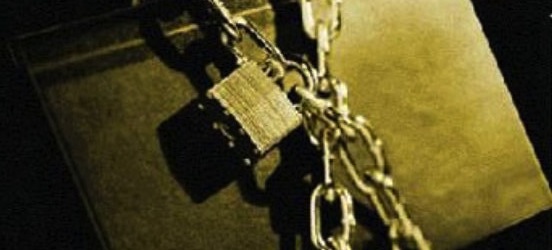The Hunger Games; Women Authors Prominent on The ALA List of Banned Books
Inside of a dog it's too dark to read

The America Library Association has announced its list of the most challenged books of 2011, that is, the books that, as have been reported to them, people have most removed or attempted to remove from schools and libraries across America. The Hunger Games, which first made it to the list in 2010, has hopped up two places from 5th to 3rd place, undoubtedly because of the attention brought to it by the movie adaptation; and To Kill a Mockingbird, and A Brave New World, both a frequent visitors of the list, are back again.
And while the list is always kind of depressing, with usually one incredibly important or uplifting title and a few easily misunderstood but easily life-changing science fiction and fantasy titles thrown in, this year marks the first time that I realized something else: The ALA list of banned books is by mostly women authors.
In fact, the last time the ALA’s list of most challenged books had less female than male authors on it, it was 2008. The book publishing industry has been criticized in the past few years for skewing, both in its publishing model and its reviewing model, towards a white male establishment, and in the face of that, this year’s list of challenged books is particularly striking, with only one white male writer on it. The list is as follows:
1. ttyl; ttfn; l8r, g8r (series), by Lauren Myracle
Offensive language; religious viewpoint; sexually explicit; unsuited to age group2. The Color of Earth (series), by Kim Dong Hwa
Nudity; sex education; sexually explicit; unsuited to age group3. The Hunger Games trilogy, by Suzanne Collins
Anti-ethnic; anti-family; insensitivity; offensive language; occult/satanic; violence4. My Mom’s Having A Baby! A Kid’s Month-by-Month Guide to Pregnancy, by Dori Hillestad Butler
Nudity; sex education; sexually explicit; unsuited to age group5. The Absolutely True Diary of a Part-Time Indian, by Sherman Alexie
Offensive language; racism; religious viewpoint; sexually explicit; unsuited to age group6. Alice (series), by Phyllis Reynolds Naylor
Nudity; offensive language; religious viewpoint7. Brave New World, by Aldous Huxley
Insensitivity; nudity; racism; religious viewpoint; sexually explicit8. What My Mother Doesn’t Know, by Sonya Sones
Nudity; offensive language; sexually explicit9. Gossip Girl (series), by Cecily Von Ziegesar
Drugs; offensive language; sexually explicit10. To Kill a Mockingbird, by Harper Lee
Offensive language; racism
That’s Aldous Huxley as the standing representative of the publishing establishment, with Sherman Alexie (of Coeur d’Alene and Spokane Tribe descent) and Korean manga artist Kim Dong Hwa as the only other men.
Is there something about the subjects that women and people of color feel are important to talk about (like sex, race, poverty, biology, and their actual effects on adolescent life), and the way that they talk about them, that makes America in general nervous? The evidence is before us. Also, and I’m actually kind of proud of this, but this is the first time I can remember seeing a graphic novel of any kind on the list. I just might have to read The Color of Earth now, and fortunately for me, my library hasn’t removed it from the shelves.
Have a tip we should know? tips@themarysue.com